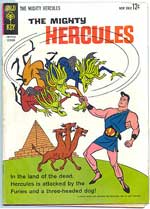|
|||||||||||||||||||||||||||||||||
| Facts > Pagan Ideas > Raised From the Dead | ||||
| Start here > | Slavery | Dreams | Demons | Soul | God | Heaven |
| Hell | Miracles | Prophecy | Eternal Life | Prayer | Godmen | |
| Virgin Birth | Phony quotes | Secret | Logos | Monotheism | Ethics | |
| Angels | Sacrifice | Baptism | Eucharist | Stuff we forgot | Mystery Religions | |
| Dying and Rising Gods | Raised from Dead | Savior | ||||
| For the ancients, Raised From the Dead was common sense. |
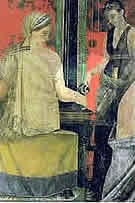
If
Christ be not risen, your faith is futile. After
nightfall they came to the tomb, burst open
the doors, came in and took away the finery,
and saw that Anthia was still alive.
We opened the tomb and found the corpse alive.
|
 |
||
It's a big deal, but away back in Bible times it was not a uniquely Christian deal—in a minute you'll read lots of blue boxes quoting ancient authors writing about people raised from the dead. But first, let's talk about why. If you've read the other stuff here at POCM > Facts > Pagan Ideas, it'll be easy for you to see how Raised From the Dead was a common sense part of the ancients' ideas about how the universe works. Let's review. |
|
Well look, if souls weren't extinguished, if they existed somewhere, obviously stuff could happen to them. Various traditions made up various stories about what happens to souls. In Egypt Ka-souls (or maybe it was Ba-souls; I have trouble keeping these things straight) stood up out of sarcophaguseses and read Pyramid Texts that guided them to Egyptian Underground Heaven. In Italy, believers-in-Dionysus-souls used spells on golden tablets to navigate past Hades' Lake of Forgetting. In Judea "souls are immortal and continued forever", and after death "rejoice and mount upward, and this is like the opinion of the Greeks." [Josephus, Jewish War, 2.8.2] |
By the way |
|
Not all early Christians believed Jesus brought salvation by rising from the dead. The Didachae did not mention His resurrection. Neither did Q. Gnostic Christians got their salvation not through Jesus's resurrection but through His's sacred wisdom teaching. For the Gnostics, to be saved you hadda go to school and learn wisdom and stuff. I think you can see why our version of Christianity is better. |
|
Outside formal traditions, the happenstance of daily life was guided by invisible magic beings: fate, gods major and minor, daemons, spirits, ghosts, angels. Here's where the common sense part comes in. It only made sense that these important invisible beings could be contacted and influenced. From the top of society to the bottom, people interacted with invisible magic beings. |
 |
Governments consulted oracles before deciding on war. Generals traveled with priests who consulted sacrifices—"the holy things"—before battle. Socrates consulted his personal daimon. Priest Plutarch interpreted the Delphic Pythia. Cicero read the flight of birds to discover the will of the Gods. Jewish King Saul delayed battle to consult God through dreams, magic rituals (Urim) and prophecy, and when those failed, he found a "necromancer," (εγγαστριμυθον) to call up a spirit from the dead [Old Testament, 1 Samuel 28].
|
| In daily life the rich and the poor consulted a menagerie of magic-dealing professionals: temple priests, dream interpreters, exorcist-healers, fortune tellers, spell casters. The ancients described these people with a technical vocabulary that we moderns have forgotten. Nowadays we say the bible's Witch of Endor was a necro-mancer, meaning one who called on the dead to prophesy. The Greeks, and the Jews who wrote the Greek version of the Old Testament, used the ancient term εγγαστριμυθον, "stomach speaker." |
The fanciful superstitionist accounts every little distemper in his body or decay in his estate, the death of his children, and crosses and disappointments in matters relating to the public, as the immediate strokes of God and the incursions of some vindictive daemon. Plutarch, On Superstition Section 7, which you can read at Perseus. |
|
The ancients' nuance is lost to us, but the big idea isn't: in the ancient world dead people were somewhere, and that meant they could do stuff. |
| Reasons preview | skip |
We know a couple background facts. First, in the ancient world, dead people were not extinguished, they existed somewhere. Some lived in Hades, some in the Elysian fields, some, if they were especially swell, ascended into the Sky and lived with the Gods. For us this is silly myth we can't take seriously. But as you're reading the blue boxes remember, for the people who wrote these texts, this was reality. So write that down. In the ancient world, after they died, people who were especially swell ascended into the Sky and lived with the Gods. Second, back in Bible times the difference between Gods and men was not absolute. Gods came to Earth looking like people. In the ancient world, people turned into Gods. Absorbing Pagan Ideas Back in Bible times people rising from the dead was a common sense part of how the universe worked. Lots of people rose from the dead. Jesus was one. Christianity was a product of it's time and place. The Apologists' Reply |
| Greggy's Guesses | skip |
|
The idea that Jesus was God came first, the stories showing how he was God came second, made up to fit the standard ancient ideas about Gods and their powers and place in the universe. Christianity is a product of its time and place. |
| Common Sense | Swell Guy | Greek Religion | Bible Religion |
Common Sense
|
|
|
|
|
While Jesus was still speaking, some men came from the house of Jairus, the synagogue ruler. “Your daughter is dead,” they said. “Why bother the teacher any more?” Ignoring what they said, Jesus told the synagogue ruler, “Don't be afraid; just believe.” He did not let anyone follow him except Peter, James and John the brother of James. When they came to the home of the synagogue ruler, Jesus saw a commotion, with people crying and wailing loudly. He went in and said to them, “Why all this commotion and wailing? The child is not dead but asleep.” But they laughed at him. After he put them all out, he
took the child's father and mother and the disciples
who were with him, and went in where the child was.
He took her
by the hand and said
to her, "Talitha koum!" (which means, "Little
girl, I say to you, get up!" ). Immediately the
girl stood up and walked around (she was twelve
years old). |
A
girl had died
just in the hour of her marriage, and the bridegroom
was following her bier lamenting as was natural his
marriage left unfulfilled, and the whole of Rome was
mourning with him, for the maiden belonged to a consular
family. Apollonius then witnessing
their grief, said : "Put
down the bier, for I will stay the tears that you are
shedding for this maiden." And withal
he asked what was her name. The crowd accordingly thought
that he was about to deliver such an oration as is commonly
delivered as much to grace the funeral as to stir up
lamentation ; but he did nothing of the kind, but merely
touching her and whispering in secret some spell over
her, at once woke up the maiden from her seeming death
; and the girl spoke out loud, and returned to her father's
house, just as Alcestis did when she was brought
back to life by Hercules. |
|
Ancient novels |
| Common Sense | Swell Guy | Greek Religion | Bible Religion |
Swell Guy
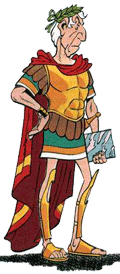
Julius Caesar, Emperor
of Rome, becomes a God In 44BC right after Julius Caesar was murdered, his body was carried to the Roman forum so everyone could have a look see. A crowd gathered. Some guy named Anthony gave a little talk in which he said Caesar was divine.One thing lead to another and by and by Rome had this thing called the Imperial Cult. First Julius then other dead Caesars were voted by the Roman senate to be divine. Somebody built temples to them, where people actually worshiped and prayed to the dead guy who was now a God living in Heaven.
|
|
|
Ovid wrote it all up in a famous poem book called Metamorphoses. Because I am not a sissy I do not normally read poem books, but for you I've excerpted the Julius Caesar apotheosis bit of Book 15 of the Metamorphosis. You are welcome. The original lines were written in latin dactylic hexameter. The lines in the translation are not. I find this sullies not a jot my reading them enjoyment. Metamorphosis came out in 8 AD (though people at the time didn't know that). |
|
Caesar is a God. >> |
[page 417] ... Caesar is God in his own city. Him, illustrious In war and peace, not so much his wars triumphantly achieved, his civic deeds accomplished and his glory quickly won, changed to a new heavenly body, a flaming star; but still more his offspring deified him. |
| Not only is Caesar is a God, he's the father of our current Emperor. >> Sometimes ancient writers like Ovid come across as pathetic groveling suck ups. Because they were. They had to be. On account of how ancient culture put power in the hands of a few rich guys and all. Although this is disgustingly un-American, I have learned to get over it, and accept them as people of their time and place. Anyway, the point Ovid is building to is, Julius Caesar is especially swell because he is the father of our current emperor, Augustus Caesar. |
For there is no work among [page 419] all Caesar's achievements greater than this, that he became the father of this our Emperor.....With him as ruler of the world, you have indeed, O heavenly ones, showered rich blessings upon the human race! So then, that his son might not be born of mortal seed, Caesar must needs be made a god. |
| The Gods knew the
coup plotters were, um, |
|
| But even the Gods
are powerless to, um, |
The anxious goddess cried these complaints throughout the sky, but all in vain. The Gods were moved indeed ; and although they were not able to break the iron decrees of the ancient sisters [fate] , |
|
|
still they gave no uncertain portents of the woe that was at hand. They say that the clashing of arms amid the dark storm-clouds and fear-inspiring trumpets and horns heard in the sky forewarned men of the crime ; also the darkened face of the sun shone with lurid light upon the troubled lands. Often firebrands were seen to flash amidst the stars; often drops of blood fell down from the clouds ; the morning-star was of dusky hue and his face was blotched with dark red spots, and Luna's chariot was stained with blood. In a thousand places the Stygian owl gave forth his mournful warnings ; in a thousand places ivory statues dripped tears, and in the sacred groves wailing notes and threatening words were heard. No victim sufficed for expiation; the liver warned that portentous struggles were at hand and its lobe was found cleft amidst the entrails. In the marketplace and around men's houses and the temples of the Gods dogs howled by night, the shades of the silent dead walked abroad and the city was shaken with earthquakes. |
| Caesar got stabbed anyway. >> |
Yet even so, the warnings of the Gods were unable to check the plots of men and the advancing fates. Naked swords were brought into the sacred curia; for no place in the whole city would do for this crime, this dreadful deed of blood, save only that. |
| After which God the Father up in Heaven said Caesar would be raised up to heaven, and be worshiped on Earth. >> |
|
Ovid was able to quote God the Father word for word, including a number of His prophecies. >> (You will be amazed to learn, all these prophecies actually came true!)
|
"When peace has been bestowed upon all lands he shall turn his mind to the rights of citizens, and as a most righteous jurist promote the laws. By his own good example shall he direct the ways of men, and, looking forward to future time and coming generations, he shall bid the son: born of his chaste wife, to bear his name and the burden of his cares; |
Blah, blah heaven. Blah blah soul.
|
and not till after he as an old mail shall have equaled Nestor's years shall he attain the heavenly seats and his related stars. Meanwhile do thou catch up this a soul from the slain body and make him a star in order that ever it may be the divine Julius who looks forth upon our Capitol and Forum from his lofty temple." |
|
Caesar's soul ascended to heaven. >> |
Scarce had he spoken when fostering
Venus took her
place within the senate-house, unseen of all, caught
up the passing soul of her Caesar from his body, and
not suffering it to vanish into air, she |
|
|
|
| Ovid, Metamorphosis, Book 15 (8 AD), -- which you can find in: Miller, Frank Justus. Ovid Metamorphoses (1916), pg. 417 ff |
|
No
surprise |
| Common Sense | Swell Guy | Greek Religion | Bible Religion |
Greek Religion
Glycon |
Asclepius healed the sick and raised the dead. |
"Asclepius was the son of Apollo [a god] and Coronis [a mortal woman—is the pattern sinking in here?]...he healed many sick whose lives had been despaired of, and... he brought back to life many who had died." |
||||||
| [Diodorus Siculus, The Library of History, 4.7.1.1- 2; Loeb 303] |
| and |
"When Hippolytus was killed,...Asclepius raised him from the dead." [Pausanias, Corinth, Description of Greece, 1.27.5] |
Hercules |
| I admit it's a bit hard for me to take Hercules seriously, Him being a comic hero from my yout' and all. The ancients though did take Him seriously. Ovid describes >> The godman Hercules died. His body was purified in a fire—the mortal part burned away, leaving just the immortal God part. Then His God part ascended to heaven where he became a full fledged God.
|
....Meanwhile, whatever the flames could destroy, Mulciber had now consumed, and no shape of Hercules that could be recognized remained, nor was there anything left which his mother gave. He kept traces only of his father; and as a serpent, its old age sloughed off with its skin, revels in fresh life, and shines resplendent in its [page 23] bright new scales; so when the Tirynthian put off his mortal frame, he gained new vigor in his better part, began to seem of more heroic size, and to become awful in his godlike dignity. Him the Almighty Father sped through the hollow clouds with his team of four, and set him amid the glittering stars. |
|
Hercules ascended to Heaven through the clouds. >> |
....Meanwhile, whatever the flames could destroy, Mulciber had now consumed, and no shape of Hercules that could be recognized remained, nor was there anything left which his mother gave. He kept traces only of his father; and as a serpent, its old age sloughed off with its skin, revels in fresh life, and shines resplendent in its [page 23] bright new scales; so when the Tirynthian put off his mortal frame, he gained new vigor in his better part, began to seem of more heroic size, and to become awful in his godlike dignity. Him the Almighty Father sped through the hollow clouds with his team of four, and set him amid the glittering stars. |
Ovid, Metamorphosis, Book 9 (8 AD), -- which you can find in: Miller, Frank Justus. Ovid Metamorphoses (1916), pg. 22-4 |
Have you ever heard a more ridiculous myth? Yes you have. |
| Common Sense | Swell Guy | Greek Religion | Bible Religion |
Bible Religion
|
|
17 Some time later the son of the woman who owned
the house became ill.
He grew worse and worse, and finally stopped breathing.
18 She said to Elijah, “What do you have against
me, man of God? Did you come to remind me of my sin
and kill my son?” |
| Old Testament, 2 Kings (author unknown) Chapter 17 |
|
|
said to David,
Know you assuredly, that you shall go out with me in
the host, you and your men. |
| OT 1 Samuel (author unknown) 1 Samuel 28, which you can read at Perseus. |
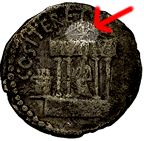
 In
our version of Christianity, the key miracle about
Jesus is that He died and came back to life. He
was dead, then He stood up and walked around. Chances
are He didn't do that on His own, what with at the time
Him being dead and all. Somebody raised
Jesus from the dead. But who?? Say, wait a minute...
I bet it was God! God raised Jesus
from the dead, and He'll raise us too! Raised
From the Dead is a big deal.
In
our version of Christianity, the key miracle about
Jesus is that He died and came back to life. He
was dead, then He stood up and walked around. Chances
are He didn't do that on His own, what with at the time
Him being dead and all. Somebody raised
Jesus from the dead. But who?? Say, wait a minute...
I bet it was God! God raised Jesus
from the dead, and He'll raise us too! Raised
From the Dead is a big deal.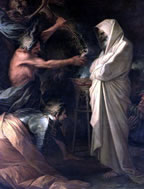 For
the ancients, people who were dead were not completely
gone, their essence did not cease to exist. When
people died, their soul left their body and went somewhere.
Souls hung around as spirits or ghosts, or they went
down under the earth to Hades, or up in the Sky to be
with the Gods and other divine beings.
For
the ancients, people who were dead were not completely
gone, their essence did not cease to exist. When
people died, their soul left their body and went somewhere.
Souls hung around as spirits or ghosts, or they went
down under the earth to Hades, or up in the Sky to be
with the Gods and other divine beings.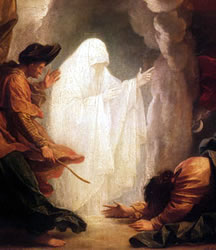
 Here
in the Facts section I'm not allowed to tell you what
I think, but while you read these ancient blue-box texts
describing people being raised form the dead, it'll
help you to keep in mind POCM's basic question:
Here
in the Facts section I'm not allowed to tell you what
I think, but while you read these ancient blue-box texts
describing people being raised form the dead, it'll
help you to keep in mind POCM's basic question:  I
know you don't care what I think. I don't want
you to care what I think. I want you read the
facts here at POCM, and decide for yourself. But I did
promise to say what I think.
I
know you don't care what I think. I don't want
you to care what I think. I want you read the
facts here at POCM, and decide for yourself. But I did
promise to say what I think.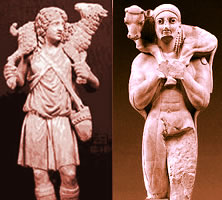 I
myself don't see how it could have been possible for
early followers of Jesus not to believe he was
raised from the dead. Jesus was a swell fellow.
He died. Away back then, after they died swell people
ascended to the Sky and lived with the Gods. If you
were a follower of Jesus who really believed He was
swell, and you knew He died, you pretty much had to
believe He must have ascended to Heaven to be with God.
I
myself don't see how it could have been possible for
early followers of Jesus not to believe he was
raised from the dead. Jesus was a swell fellow.
He died. Away back then, after they died swell people
ascended to the Sky and lived with the Gods. If you
were a follower of Jesus who really believed He was
swell, and you knew He died, you pretty much had to
believe He must have ascended to Heaven to be with God.
 The
1st century AD godman
The
1st century AD godman 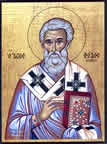 THE
WONDERS BEYOND THULE Photius's Summary (Bibliotheca
166)
THE
WONDERS BEYOND THULE Photius's Summary (Bibliotheca
166)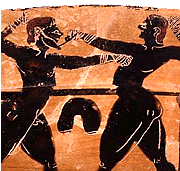 [6.9.6]
At the Festival previous to this it is said that Cleomedes
of Astypalaea killed Iccus of Epidaurus during a boxing-match.
On being convicted by the umpires of foul play and being
deprived of the prize he became mad through grief and
returned to Astypalaea. Attacking a school there of
about sixty children he pulled down the pillar which
held up the roof.
[6.9.6]
At the Festival previous to this it is said that Cleomedes
of Astypalaea killed Iccus of Epidaurus during a boxing-match.
On being convicted by the umpires of foul play and being
deprived of the prize he became mad through grief and
returned to Astypalaea. Attacking a school there of
about sixty children he pulled down the pillar which
held up the roof.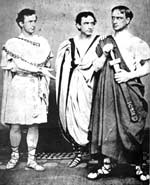 When
the golden mother of Aeneas saw ....that an armed conspiracy
was forming, she paled with fear and cried to all the
Gods as she met them in turn: "....Look!
do you not see that impious daggers are being whetted?
Ward them off, I pray, prevent this crime and
let not Vesta's fires be extinguished by her high-priest's
blood ! "[page 421]
When
the golden mother of Aeneas saw ....that an armed conspiracy
was forming, she paled with fear and cried to all the
Gods as she met them in turn: "....Look!
do you not see that impious daggers are being whetted?
Ward them off, I pray, prevent this crime and
let not Vesta's fires be extinguished by her high-priest's
blood ! "[page 421]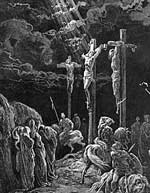 But
the Gods did send signs, aka "portents",
of the great man's death. Stuff like
But
the Gods did send signs, aka "portents",
of the great man's death. Stuff like 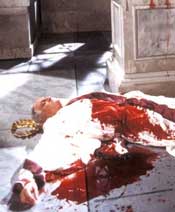
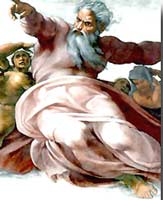 ...
Then thus
...
Then thus He
as successor to the name
He
as successor to the name 
 bore
it towards the stars of heaven.
bore
it towards the stars of heaven. And
when the current Emperor, who is a swell guy, eventually
dies —which I really hope will be a long long
time from now — he too will ascend to heaven and
become a God.
And
when the current Emperor, who is a swell guy, eventually
dies —which I really hope will be a long long
time from now — he too will ascend to heaven and
become a God.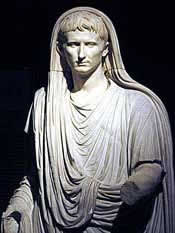 And
now, beholding the good deeds of his son, he confesses
that they are greater than his own, and rejoices to
be surpassed by him..../far distant be that day and
later than our own time when
And
now, beholding the good deeds of his son, he confesses
that they are greater than his own, and rejoices to
be surpassed by him..../far distant be that day and
later than our own time when 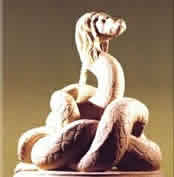
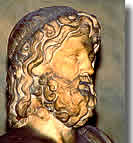

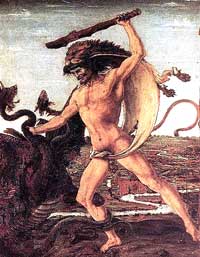 Scorn
not those flames!
Scorn
not those flames! 